![]()
The Words of Sun Myung Moon from 1986
|
|
The Words of Sun Myung Moon from 1986 |
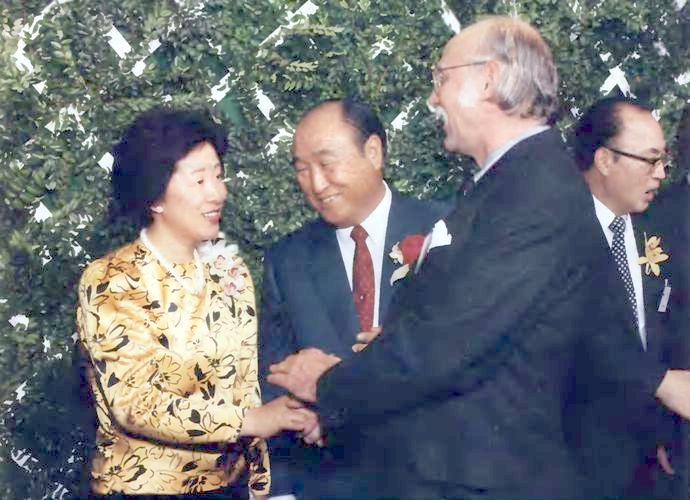
Distinguished scholars, members of the head table, ladies and gentlemen: It is my greatest honor to introduce the Reverend Sun Myung Moon to you at this farewell banquet.
Our International Cultural Foundation -- the sponsor of ICUS -- faces tremendous challenges in achieving its goal of intercultural cooperation, when customs and languages differ so dramatically from country to country. Since we all have been eating, let's look at food as an example. In America, a polite person always tries to eat soup quietly. But in the Orient when we eat soup, we always make some noise to show the host that we are really enjoying it. The more noise, the more we show our pleasure. It seems that East and West have very different customs to demonstrate the same virtue or intent.
Indeed, as I travel from culture to culture, the differences in form and expression never cease to amaze me. The word or gesture that is cheerfully received in one culture may be an invitation to trouble in another; the same quality that is admired in a person in one part of the world may be ignored, or even despised, in another.
Every once in a while, though, history gives birth to an individual whose inner qualities, lifestyle, and sense of vision reaches out beyond his or her particular section of the globe to embrace all of us. Such a person, I believe, is the man you are about to hear from. I'd like to take a moment to share a little of my personal experience with him.
As I stand before you and consider the many projects started by Rev. Moon and my early memories of him, I am struck by a deep sense of awe. In those days only one person really believed that the globe-spanning activities and projects that we see today could actually come into being -- Rev. Moon himself. Today, it is much easier to believe; we can see, touch, and participate. To what do we owe these remarkable developments?
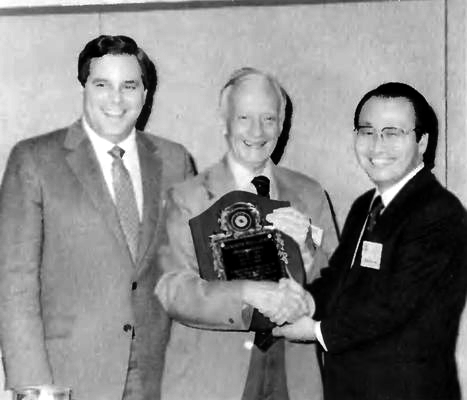
Rev.
C. H. Kwak awards Dr. Kenneth Mellanby a bronze plaque in honor of
his three years as ICUS chairman. Mr. Neil Albert Salonen, president
of ICF, is at left.
Certainly a lot of hard work has gone into it. Up to this very day, at 66 years of age, Rev. Moon sleeps less than three hours each day, and in all these years I have not met one person able to keep up with his hard-driving pace and schedule. But it has not been his hard work alone that has inspired so many others and brought forth such great works. Every activity he initiates and takes part in is done with the motivation of serving God and humanity. In all my years with Rev. Moon, I have never seen him take even one vacation from his intense commitment to God. And I believe deeply that the growth and success of Rev. Moon's projects are a testimony to the power and blessing of Almighty God.
Through his intense prayer, Rev. Moon has realized that God's heart is far from joyful. God's heart -- or Shim Jung -- is filled with intense pain because human beings have not been able to respond to His love. The image of Rev. Moon most deeply engraved on my heart, from my own experience, is the image of him in prayer with tears streaming down his face. His deepest motivation is to comfort the heart of God. This desire is the basis for Rev. Moon's efforts to close the gaps that exist as barriers between nations, peoples, races and religions.
I say these things not to make you feel uncomfortable. I know many of you are skeptical about religious matters, and I do not mean to offend. However, I do want you to understand something about the reason why Rev. Moon does what he does. His motivation and end is not power, knowledge, or wealth. It is simply his love for God and his desire to serve humanity that drives him to live out his life as intensely as he does.
To introduce such a man as Rev. Moon is not easy. He is a man who does indeed need an introduction because, even though he has achieved many outward accomplishments, his greatest deeds are by and large unseen and hidden. They lie in the realm of spirit and heart, or Shim Jung.
Jesus said, "You shall know them by their fruits" This seems to me to be a scientifically valid statement. You have witnessed some of the fruits of Rev. Moon's movement, and I suppose that most of you would not be here unless you recognized that those fruits must come from a good tree. But tonight I hope we can go beyond the realm of fruits to the realm of the spirit. Tonight I hope you will be able to "know him by his heart"
Ladies and gentlemen, I present to you the founder of the International Cultural Foundation and ICUS: the Reverend Sun Myung Moon.
Sun Myung Moon's ICUS XV Founder's Address - True Love and the Unified World
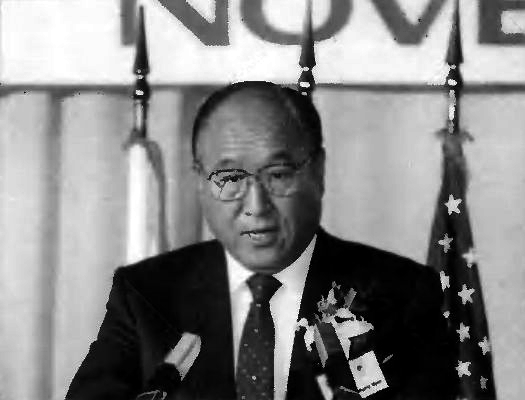
Mr. Chairman, distinguished participants, ladies and gentlemen:
It is already the final evening of our 15th ICUS conference, and I am standing before you to bid farewell for another year. It seems to me that the conference is too short, and these three days pass too quickly. I am sorry that we must bid farewell to one another again. I hope you all have enjoyed this conference as much as I have. I especially cherish the opportunity to meet many of you in person and know more about you.
As Dr. King stated in the opening remarks, we are in- deed an ICUS family. We have developed a strong family bond, in which we can feel close and comfortable. For me, this is probably the greatest accomplishment of ICUS.
Now I would like to extend my heartfelt thanks and appreciation to Dr. Mellanby, our chairman, for his outstanding and inspired leadership, not only in this year's conference, but for the last three years. Dr. and Mrs. Mellanby are among the finest people I have ever met. They shall remain as my friends forever. Could you join with me in expressing our thanks to Dr. and Mrs. Mellanby?
I would also like to express my deepest thanks to the vice-chairmen, the honorary chairmen, and the organizing committee chairmen for their outstanding performances in this year's conference. I have been told that the quality of the presentations has been the highest ever. These individuals deserve our generous thanks. Again, let us give them a round of applause.
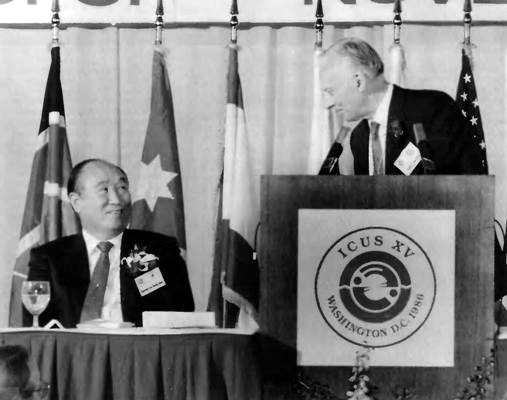
Dr.
Kenneth Mellanby asks to hear a song from Father.
But it is the participants who make the conference a success. I thank you for your participation and I am looking forward to seeing you again sometime in the future. Please, let us give ourselves a round of applause.
I am looking forward to working with Dr. Weinberg, our 16th ICUS conference chairman. Dr. Weinberg is a most distinguished and respected scientist. He shall be a tower of strength at our future conferences. Let us give our incoming chairman, Dr. Alvin Weinberg, a round of applause.
We are living in an incredible time. It is a time of many crises and a time of rapid change. In this country of the United States of America there are many difficulties -- at the White House, in the Congress, and in other places. Around the world, we see crucial situations in Iran and Nicaragua, in the Philippines, and in South Korea. Who shall be the guiding light to the world in crisis? My answer is you. You, the scholars and intellectual leaders of the world. You are the people who will devise solutions to existing world problems.
There is a solution to every problem. We must have confidence in God and confidence in ourselves, and work diligently to find them. With bright vision, we can search for the solutions to our problems today. The survival of all of humanity is at stake. I would like to see ICUS as a foremost contributor to world problem solving. ICUS is now 15 years old; it is no longer a child. It is reaching its prime and is full of vitality. We certainly can make this ICUS movement one of the brightest spots in an uncertain world. We can make it an instrument of lasting peace. Long live ICUS!
We will convene our 16th ICUS conference in the city of Atlanta, Georgia. It will be a beautiful site for you to come to next year. I wish every one of you a safe journey back home. Have a joyous and blessed holiday season and a Happy New Year.
Thank you very much.
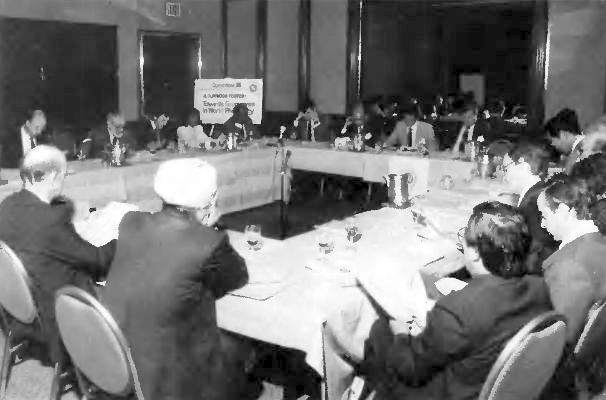
Members
of Committee III follow the presentation of a paper.
It was a Thanksgiving to remember. The tables at the elegant J. W. Marriott Hotel in Washington DC were laden with sumptuous fare, and animated conversation filled the ballroom that evening. Gathered there were 245 scientists from 43 nations, attending the welcoming banquet of the 15th annual International Conference on the Unity of the Sciences.
Father and Mother greeted each person warmly in the receiving line. Among the participants were eight scientists from the People's Republic of China, three from Hungary, and one from Yugoslavia. Sixty-three of the scholars came from the developing world, and 50 from the Orient.
The banquet marked the beginning of three days of deliberations and discussions by seven ICUS committees on the following topics: Unifying Principles in Science (Committee I); The Value of Human Life (Committee II); Toward Ecumenism in World Philosophy (Committee III); The Relationship Between Science and the Arts and Its Relevance to Cultural Transformation (Committee IV); Problems of Third World Development: The Case of Africa (Committee V); Eastern Approaches to Knowledge and Values with an Emphasis on Qi (Committee VI); and Global 2000 Revisited: Reassessing Man's Impact on Spaceship Earth (Committee VII).
The morning after Thanksgiving, Father presented the Founder's Ad- dress at the opening plenary session [see p. 41. He called on the scientists to work for world peace by educating people in a new internationalism based on love of neighbor.
"Before the peace and unification of the world can be contemplated' he cautioned, "one must know how to educate people so that they can completely overcome their own sense of nationality in favor of the world:'
"Today's human society is corrupt," he said, "and philosophies are becoming self-centered. To sweep away these philosophies, only God's love, true love, can suffice. True love is the love to give and give without expecting any return. Give and forget'
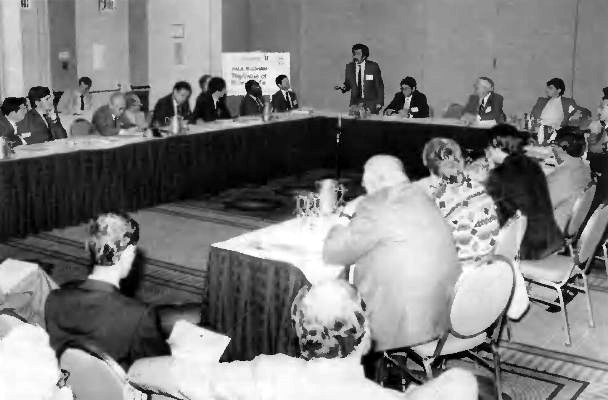
A
point is made during a meeting of Committee ll.
Then Dr. Kenneth Mellanby, chairman of this year's conference as he has been for the preceding two, delivered brief welcoming remarks in which he warned his colleagues that science must be guided by values if it is to save mankind. "It is only through faith and confidence that the great perils in which the world stands today can be avoided;' he said. Dr. Mellanby, an ecologist, is director emeritus of the Monk's Wood Experimental Station in Huntingdon, England.
"Science has not brought us to this point;' he continued." It is the misuse of science, through ethical and moral failure, that has caused our problems; and it is through the proper use of science -- a sharing of knowledge, a truly moral approach to scientific research and progress -- that we shall save the world, through genuine compassion for nature and for mankind."
Dr. Mellanby will be passing on the chairmanship of the conference to Dr. Alvin Weinberg, a nuclear physicist who is a Distinguished Fellow at the Institute for Energy Analysis in Oak Ridge, Tennessee.
During the three working days of the conference, 83 scholarly papers were presented on subjects as diverse and interdisciplinary as applying the concept of entropy to economics, the moral implications of human genetic engineering, and the impact of science on culture. Each paper had been carefully refined at several committee meetings earlier in the year.
Dr. Alfredo Lagmay, a professor from the University of the Philippines who was participating in his second ICUS, said, "The quality and depth of the papers that emerge... is very high. The method of developing the papers through pre-conference sessions leads to a conference which is intensely stimulating and among the best [in the world}
Each ICUS conference has become such a concentration of far-ranging and unique ideas that it's impossibly for a casual observer to assimilate more than a fraction of it. It's not just a three-day affair, but the culmination of a year of work.
Paying his first visit to an ICUS meeting, Dr. Robert Jastrow, a Dartmouth College professor who is also the founder and past director of NASA's Goddard Institute for Space Studies, said, "The ecumenical spirit that pervades this conference is a revelation and a delightful surprise to me'.' He gave an address at the opening plenary session in which he suggested that the computer, with its rapidly developing levels of sophistication, will likely evolve into an actual silicon-based organism of superior brain power.
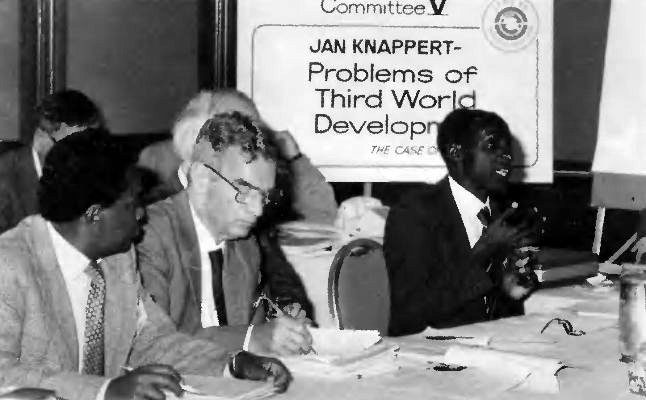
A
discussion of a paper in Committee V.
As the ICUS committees began to get down to business Friday afternoon, Committee I delved into subjects such as the "psychobiology" of space and time, symmetry in art and nature, and how the "unifying concept" of entropy can be useful in economics, anthropology, and biology, as well as in traditional thermodynamics, where it was first conceived and applied.
The second committee investigated moral issues such as the right to die, in vitro fertilization, manipulating the genetic code of man, birth control, and the ethical questions raised by the birth of severely handicapped infants. A paper was also presented on the apparent clash between the "absolutist" stand on the sanctity of human life, as taken by the pro-life movement among others, and the "relativist" stand taken by proponents of such ideas as the just-war theory.
Among the 11 papers in Committee III, one focused on how a denomination of Hinduism called Advaita Vedanta has contributed to purposefulness in the lives of individuals, as well as religious harmony. Another paper described the "radical monotheism" of H. Richard Niebuhr, an American theologian who was active earlier in the 20th century. It was argued that Niebuhr's theology was a "world theology" -- one that can reach beyond the bounds of a particular religious tradition.
The fourth committee discussed "cultural earthquake" phenomena and their impact on society. Some of the "earthquakes" given as examples were Albert Einstein's special and general theories of relativity published in 1905 and 1918; the Cubist-Futurist movement in painting exemplified by its manifesto of 1909 and Marcel Duchamp's Nude Descending a Staircase; the Bauhaus movement in architecture led by Walter Gropius; and the stream-of-consciousness novel Ulysses by James Joyce.
Committee V explored problems be- setting the Third World. Papers dealt with water resources, desertification, agriculture and deforestation, women in Africa, education, refugee problems, protecting the African environment and natural species, and the relative appropriateness of democracy and communism in developing nations.
In the sixth committee, nine papers were spun off from the topic "Eastern Approaches to Knowledge and Values, with an Emphasis on Qi." Qi, or Chi, a Chinese word usually translated as "vital force" or "universal energy:' has both a material and a spiritual connotation, similar to the Principle concept of "universal prime force' Committee participants sought to clarify the East's "holistic viewpoint" using the concept of Qiani to compare it with Western philosophy.
The title of Committee VII, "Global 2000 Revisited' stemmed from a pessimistic report on world resources called The Global 2000 Report to the president issued in the closing days of the Carter administration. Because of its prediction of ecological apocalypse at the turn of the century, it led to sharp controversy. Shortly after, the Heritage Foundation, a conservative Washington think tank, issued a report known as The Resourceful Earth that widely contradicted Global 2000. In the spirit of The Resourceful Earth, Committee VII examined hopeful solutions to acid rain, the depletion of tropical rain forests, air and water pollution, sea-level fluctuations, and nuclear waste and toxic waste disposal.
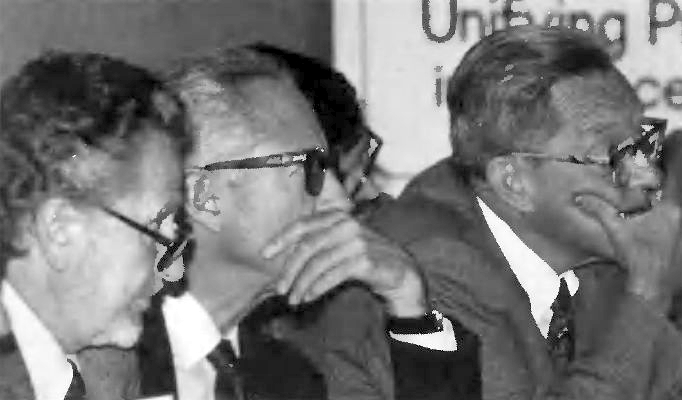
Scholars
listen intently to an argument brought up in Committee I.
Dr. Alvin Weinberg, one of the two vice-chairmen of the conference this year, neatly expressed the idea of ICUS as a wellspring of creativity, saying that the seven committees of ICUS XV were like "seven ad hoc think tanks:' "ICUS creates new insights and sharpens understanding; and it might have an influence on public policy," he said. "We are very grateful for Rev. Moon's dazzling vision of an ecumenical science."
"ICUS is the only world occasion where scholars from diverse disciplines can come together and discuss mutual interactions in their work as a multidisciplinary attack on global problems;' said Dr. Alexander King, the second vice-chairman of this year's conference.
Late Saturday afternoon, some of the staff of The World and I magazine held a reception, attended by many of the participants, in order to introduce the magazine to them. Rev. Kwak said after the conclusion of the conference that the scientists have begun to recognize the value of the publication. "Through The World and I," he said, "ICUS scholars and PWPA [Professors World Peace Academy] participants have a vehicle to approach the world, to guide and influence people, affect history, and achieve world peace'
Dr. Mellanby, in a statement to the press, noted that the sponsorship of ICUS still generates some negativity and controversy in the scientific community and leads to "disappointing" refusals by some to attend the conferences. "But in my experience, this attitude is becoming less common," he said, "and the majority of those considered suitable to invite have in fact accepted. Some have done so with misgivings, but I do not know of a single case where these have not been completely dispelled after taking part."
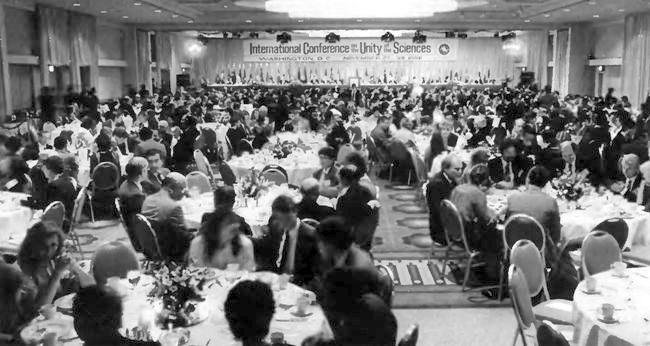
The
guests gather for the closing banquet.
Despite the skepticism of those who never had a firsthand experience of ICUS, the conference has developed into a truly intimate, "family"-type affair.
On Saturday, for example, multiracial members of the committee studying Eastern approaches to knowledge and values (Committee VI) were observed sitting at their luncheon table chatting and joking together in such a fraternal way as if they had known each other for years.
On Sunday, an impromptu afternoon concert was held in a lower atrium of the hotel on an inspiration that came out of a session of the science-and-the-arts committee. It was attended by some 25 or 30 of the participants. Chairs were set up and an upright piano hastily procured from the Marriott management. Then Leif Aulin, solo violinist with the Goteborg (Sweden) Opera, and Divina Bautista, professor of music at the University of Baguio in the Philippines, delighted their audience for about 30 minutes with performances of Vivaldi, Debussy, and others.
The scientists' work drew to an end with the closing plenary session on Sunday afternoon. The two vice- chairmen, Drs. King and Weinberg, summed up the work of all seven committees from the point of view of the two enduring themes of ICUS: the unity of knowledge, and science and values.
At the end of the session, Dr. Mellanby was awarded a bronze plaque in honor of his three years as ICUS chairman. The executive director of ICUS, James Baughman, prefaced the award with a little story and a warm expression of affection for the kindly, 78-year-old Briton. Mr. Baughman, a graduate of the Unification Theological Seminary, said that Rev. Moon always encourages the seminary students, who provide the staffing for the conferences, to "learn from the professors and become their apprentices" He said that he had been able to have a thoroughly fulfilling experience in this regard with Dr. Mellanby. It was only with difficulty that he fought back tears as he embraced his warm-hearted mentor.
Rev. Kwak later said that the conference was successful largely because of Dr. Mellanby's "harmonious relationships with the founder and his vision for ICUS."
During the conference, some longtime ICUS participants were asked about their private feelings concerning Rev. Moon. They spoke in varying ways of their admiration for his character and vision, especially with regard to establishing the conferences. In a statement that was representative of many others, Dr. King, who is president of the Club of Rome, a diverse, Paris-based group of about 100 people who develop creative solutions to international problems, said simply, "I have the greatest respect for Rev. Moon:'
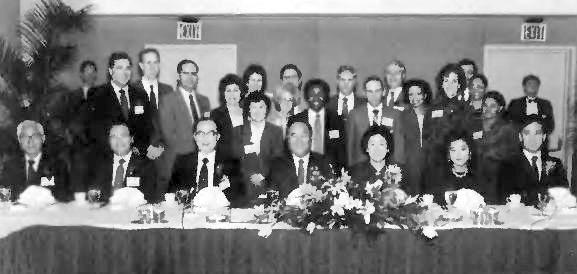
The
ICUS staff pose with True Parents. Seated, left to right: Professor
Se Won Yoon, Rev. C. H. Kwak, Dr. Bo Hi Pak, Father, Mother, Un Jin
Nim, and Jin Hun Nim.
At the farewell banquet, the scholarly assemblage could finally relax after three days of concentration on their work. After an exquisite dinner the lights dimmed, and the New York City Symphony, with David Eaton conducting, enchanted the scientists with excerpts from Georg Friedrich Handel's Water Music and a Mozart serenade. Afterward, Georgia Lewis, a silver-voiced member of the Unification Church who was born in Liberia and who now lives in New York, thrilled the audience with several vocal selections arranged by Kevin Pickard, presently head of the Performing Arts Department in New York City, and accompanied by the New York City Symphony.
After the entertainment, Dr. Mellanby rose and, gesturing toward Father who was sitting at the head table, said it was "an honor" to know him. "I've never met a man who combined such a sense of humor with deadly seriousness about the major problems of the world;' he told the participants.
The groundwork having been laid, in effect, by Dr. Mellanby, Rev. Kwak gave a deep and moving introduction to Father. He testified to Father's tireless work on behalf of the people of the world, noting that he sleeps less than three hours a day. "His greatest deeds are by and large unseen and hidden. They lie in the realm of the spirit:' Rev. Kwak said, describing Father's powerful prayer life and his zeal to comfort God's heart.
Then Father took the podium and delivered his closing remarks. He noted the quality to which ICUS has climbed, stating that the conference, now 15 years old, is "no longer a child. It is reaching its prime and is full of vitality:'
"I would like to see ICUS as a foremost contributor to world problem solving;' he continued. "We certainly can make this ICUS movement one of the brightest spots in an uncertain world. We can make it an instrument of lasting peace:'
Speaking in his office in New York after the conference, Rev. Kwak, elaborating on Father's words, said the main point of the conferences is to promote in scientific inquiry a rooted-ness in absolute values. It is to bring scientists together from varying disciplines to build a grand mosaic of global knowledge, and to see their work against the backdrop of absolute values. This recalls the passage in the Introduction to Divine Principle: "The day must come when religion and science advance in one united way, so that man may enjoy eternal happiness, completely liberated from ignorance and united toward goodness, which is what the original mind desires:'
A key part of Father's farewell speech was when he said, "The greatest accomplishment of ICUS is that we have established a close and warm family bone. And indeed it was so. Following Father's address, Dr. Mellanby again stepped to the microphone and made one "final request" -- to hear Father deliver a song to the assembled scholars! Everyone laughed, including Father, who got up, went to the podium, and immediately launched into a Korean folk song in his gravelly, bass voice. Few of the participants could understand the words, but Father injected into the song an eloquent vibrancy and a lightheartedness that touched everyone's heart.
ICUS XVI, it was announced, will be held in November 1987 in Atlanta, Georgia.
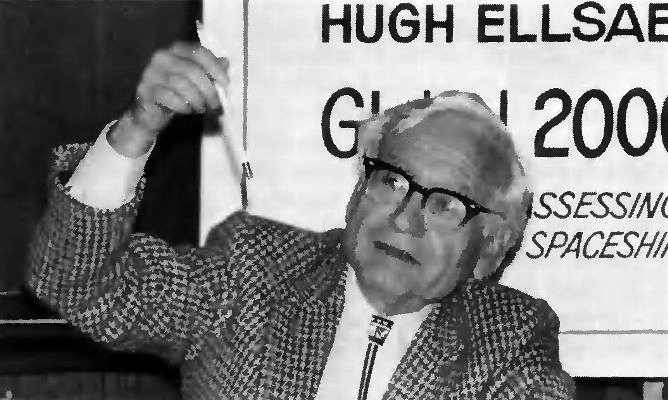
Dr.
Alvin Weinberg will assume the chairmanship for ICUS XVI.
I have been attending the ICUS seminars since 1979, and I have been a committee organizer for three of those years. What keeps me interested in coming again and again is the interdisciplinary character of ICUS, on the one hand, and especially its unique relation to my own field of physics. The Unification theory deals among other things with the unification of mind and matter. This is exactly my field of research.
You probably know that it is only recently that science has opened up to matters of the invisible, the mind, etc. This is especially true in the field of physics, which until now has been a so-called materialistic science.
Rev. Moon's main thrust in ICUS seems to be the harmonization of the world of matter and the world of mind. I am sure he has been thinking for years that the reality of the mind can be demonstrated and proven through science. I agree totally with this, and that's why I am also interested in all the other activities and projects that Rev. Moon and his church are undertaking.
This is my first time attending an ICUS conference. Many issues and problems are being discussed here on not only an academic but also on a practical level. I don't think we can make major changes on the world scene, because those discussions are conducted by politicians. We scientists can only make proposals and recommendations. Yet I can certainly say that this kind of conference will help me in my academic field, and it definitely has already had international effect.
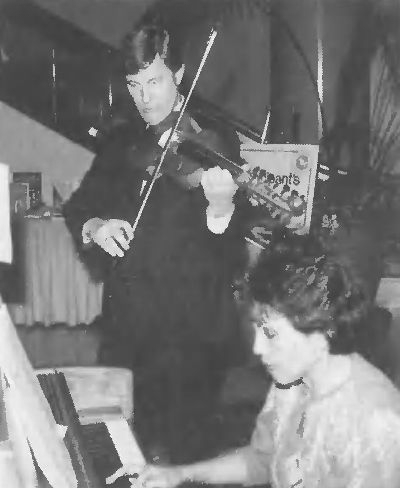
During
a break, two of the participants hold an impromptu concert.
My husband and I have attended ICUS conferences three or four times, and we always receive great stimulation from them. Here you can talk freely with people who are not necessarily working in the same field. These meetings have not only external benefits; they are cross-cultural and cross-ethnic. Living in England we only work with Europeans; we see few Japanese or Americans. But here we can meet educated people from poorer countries, like the Philippines, and realize that we are all the same.
We certainly hope ICUS continues. Maybe it would be suitable for it to remain somewhat small in size. We used to have more than 500 scientists at one time. But in this smaller size there is more of a possibility to get to know one another and to look forward to seeing each other again. It almost feels like a family reunion.
Things do change. The attitude toward the Unification movement has begun to change in Great Britain, because the public has come to know more about what it really is. Of course it is hard to tell if there are any substantial changes of values in society yet or not. But I feel change is happening in a subtle way and that this movement is contributing enormously. A conference like this, where people reflect on their own values and those of others, is bound to reach out to the world.
I am attending this conference for the first time. Until now I was not even aware that something like ICUS existed in the world. Especially important to me are the East/West issues that are being discussed here. I am definitely convinced that the understanding of human psychology, such as we are gaining here, will lead to a better world, and that through this kind of effort the unification of the world will be accomplished. Many people are coming together here on the same platform; that in itself is already a great success.
We from underdeveloped countries have to learn lessons from developed countries, but also it's the other way around. For example, the developed countries usually don't consider how to control pollution in the atmosphere. In our case, nature has been protecting us from man's interference so far. People should know what's happening in other fields and other countries. Attending these lectures creates an awareness of other areas. Through this, unification can happen.